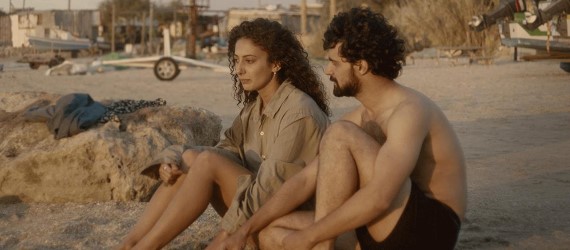Nine Arab short films and 30 feature-length works from the region will be shown at the Amman International Film Festival this month.
The event, Jordan’s first international film festival, was initially set to take place in April, however, like most events of its kind, the festival was delayed due to the coronavirus outbreak. It is now set to take place from Sunday, August 23, to Monday, August 31.
The festival will open with the Oscar-nominated French drama Les Miserables. Inspired by the 2005 French riots and the period of civil unrest and lootings that followed, the film – directed by Ladj Ly – explores the tension between neighbourhood residents and the police that inflamed the riots.

Nine Arab short films and 30 feature-length works from the region will be shown at the Amman International Film Festival this month.
The event, Jordan’s first international film festival, was initially set to take place in April, however, like most events of its kind, the festival was delayed due to the coronavirus outbreak. It is now set to take place from Sunday, August 23, to Monday, August 31.
The festival will open with the Oscar-nominated French drama Les Miserables. Inspired by the 2005 French riots and the period of civil unrest and lootings that followed, the film – directed by Ladj Ly – explores the tension between neighbourhood residents and the police that inflamed the riots.
“More than 700 films were submitted to the festival,” Hanna Atallah, artistic director of the AIFF said. “The selected films are all recently produced and will be shown for the first time in Jordan.
“They are mainly by first-time filmmakers, as per the festival’s specific edge. They use an interesting innovative cinematic language. We are glad that several Jordanian films are competing for the Black Iris Award in different categories.”
The Black Iris Award is open to directors or main producers of Arab origin who have released films in the past year. The competition comprises three categories: feature narrative film, feature documentary and short film.
Here are a few of the feature works by Arab filmmakers that will be screening at the festival.
‘You Will Die At Twenty’
The drama by Sudanese filmmaker Amjad Abu Alala has raked in a number of awards and nominations since it premiered in 2019, including the Grand Prix du Jury at the Amiens International Film Festival and the Luigi De Laurentiis Award at the Venice Film Festival.
The film tells the story of 19-year-old Sudanese Muzamil, who is predicted by the village holy man to die after his 20th birthday.
Born in Al Ain, Abu Alala started making short films in the early 2000s as a student at the United Arab Emirates University. In The National earlier this year, he said: “I wanted to tell Muzamil, the character, that you belong to yourself, not to your society, not your mother, not to your sheikh. Not to anyone.”
‘Haifa Street’
The war film by Iraqi filmmaker Mohanad Hayal is set in 2006, when Baghdad was ravaged by sectarian violence
The film unravels the drama that exists between a sniper, a suitor and the woman he wants to marry.
‘Between Heaven and Earth’
This is not your typical love story. The film by Najwa Najjar is about a couple, Salma and Tamer, who cross the Israeli checkpoint to file for divorce. In court, they discover a shocking detail about Tamer’s father’s past.

Nine Arab short films and 30 feature-length works from the region will be shown at the Amman International Film Festival this month.
The event, Jordan’s first international film festival, was initially set to take place in April, however, like most events of its kind, the festival was delayed due to the coronavirus outbreak. It is now set to take place from Sunday, August 23, to Monday, August 31.
The festival will open with the Oscar-nominated French drama Les Miserables. Inspired by the 2005 French riots and the period of civil unrest and lootings that followed, the film – directed by Ladj Ly – explores the tension between neighbourhood residents and the police that inflamed the riots.
“More than 700 films were submitted to the festival,” Hanna Atallah, artistic director of the AIFF said. “The selected films are all recently produced and will be shown for the first time in Jordan.
“They are mainly by first-time filmmakers, as per the festival’s specific edge. They use an interesting innovative cinematic language. We are glad that several Jordanian films are competing for the Black Iris Award in different categories.”
The Black Iris Award is open to directors or main producers of Arab origin who have released films in the past year. The competition comprises three categories: feature narrative film, feature documentary and short film.
Here are a few of the feature works by Arab filmmakers that will be screening at the festival.
‘You Will Die At Twenty’
The drama by Sudanese filmmaker Amjad Abu Alala has raked in a number of awards and nominations since it premiered in 2019, including the Grand Prix du Jury at the Amiens International Film Festival and the Luigi De Laurentiis Award at the Venice Film Festival.

The film tells the story of 19-year-old Sudanese Muzamil, who is predicted by the village holy man to die after his 20th birthday.
Born in Al Ain, Abu Alala started making short films in the early 2000s as a student at the United Arab Emirates University. In The National earlier this year, he said: “I wanted to tell Muzamil, the character, that you belong to yourself, not to your society, not your mother, not to your sheikh. Not to anyone.”
‘Haifa Street’
The war film by Iraqi filmmaker Mohanad Hayal is set in 2006, when Baghdad was ravaged by sectarian violence.
The film unravels the drama that exists between a sniper, a suitor and the woman he wants to marry.
‘Between Heaven and Earth’
This is not your typical love story. The film by Najwa Najjar is about a couple, Salma and Tamer, who cross the Israeli checkpoint to file for divorce. In court, they discover a shocking detail about Tamer’s father’s past.
The film won the Naguib Mahfouz Award for Best Screenplay at the 2019 Cairo International Film Festival, and was also nominated for the coveted Golden Pyramid.
“I didn’t think about it, at the time, as being about divorce and a divided territory,” Najjar told The National this year. “I just thought about a couple who are trying to love each other in the most difficult circumstances. For the husband, it’s even more difficult – he’s the son of a revolutionary killed in Beirut. The wife, she is from Nazareth. These are almost forgotten Palestinians because they have Israeli nationality, yet they are fourth or fifth-class citizens.”
‘The Women in Block J’
Three women from disparate social backgrounds have depression diagnosed and are hospitalised in a women’s psychiatric ward in Casablanca. The film, directed by Moroccan filmmaker Mohamed Nadif, follows their adventures as they sneak out of the ward in occasional nocturnal escapades that forge a strong friendship between them. The film was nominated for the Horizons Award at the 2019 Cairo International Film Festival.
‘A Son’
On the drive home from a work event, tragedy strikes when a family find themselves in the middle of a crossfire between extremists and the Tunisian military. Aziz, 10, is shot and critically wounded during the attack. His parents, Meriem and Fares, rush to take the boy to the hospital and are told that he needs a liver transplant. But when the doctors run blood tests to try to match a family member as a donor, the family is rocked by the revelation that Fares is not Aziz’s father.

The film, directed by Tunisian filmmaker Mehdi Barsaoui, has raked in a number of prestigious accolades. It won the Horizons Award at last year’s Cairo International Film Festival and was nominated for the Venice Horizons Award at the Venice Film Festival.
‘Ibrahim: A Fate To Define’
This documentary by Lina Al Abed uncovers the mysteries surrounding her father’s disappearance. Al Abed’s father, Ibrahim, went missing when the Palestinian filmmaker was just six years old.

“My self-defence as a child was my imagination,” she told The National last year. “Until I finished high school, whenever people asked me about my father, I pretended he was still around. I would say he was away travelling and he brought me things back. I understood later that it was my defence mechanism to understand this trauma.”
The film won El Gouna Star for Best Arab Documentary Film at Egypt’s El Gouna Film Festival in 2019.
‘Luxor’
Luxor will be the last film screening at the AIFF. The drama, directed by British-Jordanian filmmaker Zeina Durra, tells the story of a British aid worker who returns to the ancient city of Luxor, where she crosses paths with Sultan, an archaeologist who is also her former lover. The film was nominated for the Grand Jury Prize at this year’s Sundance Film Festival.
A Hybrid Approach
Organisers are putting a number of social-distancing regulations in place for the event. Two locations have been selected for the outdoor screenings: three drive-in cinemas are being set up in the New Abdali area, while the open-air theatre of Jordan’s Royal Film Commission in Jabal Amman will also be used as a venue for the festival.
Organisers are also adopting a hybrid approach for the Amman Film Industry Days (Afid), which will run in conjunction to the festival. Previously planned seminars, workshops and talks with industry professionals as part of the event will now take place online.
The Afid also features a pitching platform, which is designed to boost up-and-coming filmmakers from the region. A total of 14 projects were selected to present in both the development and post-production categories. The Afid pitching platform will help the filmmakers behind the projects to advance and complete their films.
“The festival is happening against all odds,” festival director Nada Doumani said.
“In these peculiar times, we are more than ever in need of cultural opportunities, and we strongly believe in the power of art and creativity and the necessity to support filmmakers in Jordan and the region.”
www.thenational.ae




